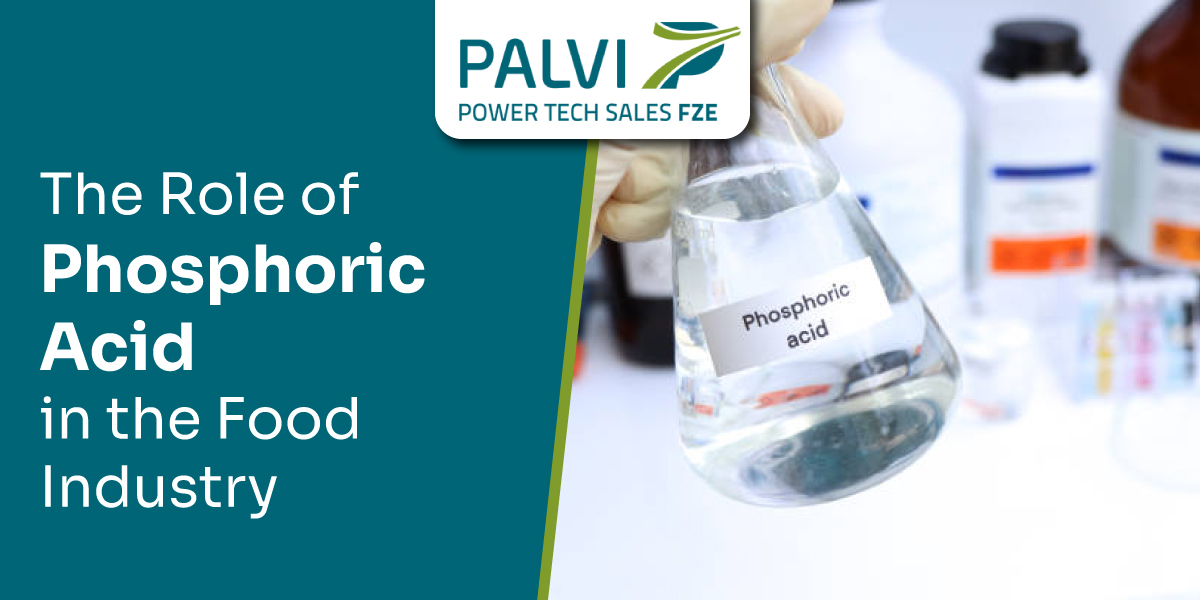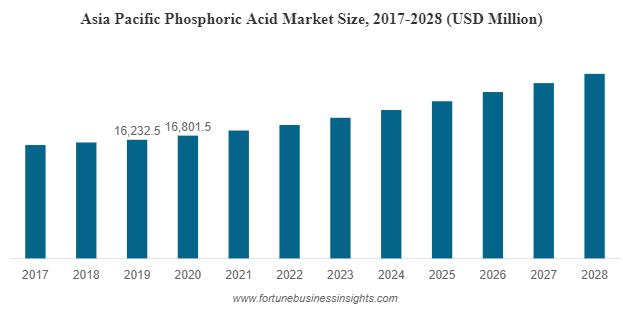
The Role of Phosphoric Acid in the Food Industry
07 April 2023
With a CAGR of 4.7% between 2020 and 2028, the global market of phosphoric acid is expected to grow from USD 31,367.7 mn in 2020 to USD 44,873.5 mn afterwards. Contributing to India’s economy, Palvi FZE - an excellent Phosphoric Acid distributor in Saudi Arabia offers top-class industrial chemicals that can fulfil all your business needs and help you scale up your business.
Next to sulphuric acid When it comes to industrial production, phosphoric acid comes in at a close second. An important phosphoric oxygen acid, phosphoric acid (H3PO4) is a byproduct of the production of phosphate salts for fertilisers. In addition to its application in sugar and textile production, it is also a key ingredient in dental cement and the production of albumin derivatives. It adds a tangy, fruity flavour to processed foods.

Source: Fortune Business Insights
Phosphoric Acid:
Phosphoric acid is a colourless and odourless inorganic acid with the chemical formula H3PO4. It is also known as orthophosphoric acid, and it is a common mineral acid used in a wide range of industries and applications.
Phosphoric acid is primarily used to produce fertilizers, particularly those containing phosphorus. It is also used in the food and beverage industry as a pH adjuster and acidifying agent, especially in carbonated drinks. In addition, it is used as a rust inhibitor and a cleaning agent for metals and other surfaces.
Phosphoric acid is a strong acid and can be hazardous if not handled properly. It can cause severe burns and respiratory problems if it comes into contact with the skin, eyes, or lungs. However, it is an important chemical with many practical applications in various fields of industry and research.
Applications of Phosphoric Acid in various industries:
- Fertilizer Industry: Phosphoric acid is primarily used in the production of fertilizers, particularly those containing phosphorus. It is a key component of superphosphate and triple superphosphate fertilizers.
- Food and Beverage Industry: Phosphoric acid is commonly used in the food and beverage industry as a pH adjuster and acidifying agent, especially in carbonated drinks. It is also used in the production of cheese, canned and processed foods, and baking powder.
- Water Treatment: Phosphoric acid is used in the water treatment industry to control the pH level of water and to prevent the formation of scale and corrosion in pipelines and equipment.
- Metal Treatment: Phosphoric acid is used in metal treatment to remove rust and scale from metal surfaces. It is also used in the production of metal coatings and plating.
- Pharmaceuticals: Phosphoric acid is used in the pharmaceutical industry as an excipient in tablet formulations and as a pH adjuster in liquid formulations.
- Electronics: Phosphoric acid is used in the electronics industry to etch silicon wafers during the production of semiconductors.
- Chemical Manufacturing: Phosphoric acid is used as a catalyst in chemical reactions, including the production of detergents, plastics, and pharmaceuticals.
If you are a phosphoric acid exporter in Saudi Arabia, you can expand your business by partnering with Palvi FZE. Being one of the leading Phosphoric Acid exporters in Saudi Arabia, Palvi FZE has a strong global network of clients and suppliers. Partnering with us can help you reach new markets and increase your sales volume.
Phosphoric acid in the food and beverage industry:
Phosphoric acid is commonly used in the food and beverage industry as a pH adjuster and acidifying agent. Its sour taste and acidic properties make it a popular ingredient in many food and beverage products. Here are some examples of its use in the food and beverage industry:
- Carbonated Beverages: Phosphoric acid is a key ingredient in many carbonated soft drinks, including colas. It provides a tart flavour and helps to balance the sweetness of the sugar or high-fructose corn syrup used in the beverage. Phosphoric acid is also used to control the acidity level in these drinks.
- Canned and Processed Foods: Phosphoric acid is used in canned and processed foods as a preservative and acidifying agent. It helps to extend the shelf life of these products by preventing the growth of bacteria and other microorganisms.
- Cheese: Phosphoric acid is used in cheese-making to lower the pH of the milk and to coagulate the milk proteins. This helps to form a curd that can be processed into various types of cheese.
- Baking Powder: Phosphoric acid is a key ingredient in baking powder, which is used to leaven baked goods. When combined with baking soda, it releases carbon dioxide gas, which causes the batter or dough to rise.
- Flavours and Emulsifiers: Phosphoric acid is used as a flavour enhancer and emulsifier in some food products, including salad dressings, mayonnaise, and processed cheese.
However, it's worth noting that excessive consumption of foods and beverages that contain phosphoric acid can have negative effects on dental health and bone density, so it's important to consume it in a balanced manner.
Physical and Chemical Properties of Phosphoric Acid:
- Molecular formula: H3PO4
- Molecular weight: 97.99 g/mol
- Density: 1.885 g/cm³
- Melting point: 42.35°C
- Boiling point: 158°C (at 1 atm pressure)
- Solubility: Phosphoric acid is soluble in water, with a solubility of approximately 85 grams per 100 mL of water at room temperature.
- Acidic properties: Phosphoric acid is a strong acid, with a pKa value of 2.14, 7.20, and 12.35 for the first, second, and third dissociation constants, respectively. This means that it can donate three hydrogen ions (protons) when dissolved in water, making it a triprotic acid.
The properties of Phosphoric Acid that make it ideal to use in the food industry:
Phosphoric acid is a commonly used food additive that is generally recognized as safe (GRAS) by the U.S. Food and Drug Administration (FDA). Here are some of the properties of phosphoric acid that make it ideal for use in the food industry:
- Acidic Properties: Phosphoric acid is a strong acid that is commonly used as an acidifying agent in the food industry. Its sour taste and acidity help to enhance the flavours of certain foods and beverages.
- pH Adjustment: Phosphoric acid is also used as a pH adjuster in many food products, particularly in carbonated beverages. Its ability to control the pH of food and beverages helps to improve their taste, texture, and appearance.
- Preservative Properties: Phosphoric acid has antimicrobial properties that can help to prevent the growth of harmful bacteria and other microorganisms in food products. This makes it an ideal preservative in canned and processed foods.
- Emulsifying Properties: Phosphoric acid is also used as an emulsifying agent in some food products. Its ability to stabilize emulsions helps to improve the texture and appearance of certain foods and beverages, such as mayonnaise and salad dressings.
- Solubility: Phosphoric acid is highly soluble in water, which makes it easy to incorporate into food and beverage formulations.
Potential health risks associated with the consumption of Phosphoric Acid in large quantities:
While phosphoric acid is generally considered safe for consumption in small amounts, excessive consumption of foods and beverages that contain high levels of phosphoric acid can have potential health risks. Here are some of the potential health risks associated with consuming phosphoric acid in large quantities:
- Dental Health: Phosphoric acid can erode tooth enamel over time, leading to tooth decay and cavities. This is particularly a concern with carbonated soft drinks, which contain high levels of phosphoric acid.
- Bone Health: Excessive consumption of phosphoric acid has been linked to decreased bone density, which can increase the risk of fractures and osteoporosis. This is because phosphoric acid can interfere with the body's ability to absorb calcium, which is essential for bone health.
- Kidney Stones: High levels of phosphoric acid in the diet can increase the risk of kidney stones. This is because phosphoric acid can contribute to the formation of calcium stones in the kidneys.
- Digestive Issues: Consuming large amounts of phosphoric acid can also cause digestive issues such as nausea, diarrhoea, and abdominal pain.
- Mineral Imbalance: Consuming excessive amounts of phosphoric acid can lead to a mineral imbalance in the body, as it can interfere with the absorption and utilization of other important minerals such as magnesium and zinc.
Final Thoughts:
Phosphoric acid is a versatile chemical that has many industrial and food-related applications. Its physical and chemical properties make it a useful ingredient in fertilizers, water treatment, metal treatment, pharmaceuticals, and other applications. In the food industry, phosphoric acid is commonly used as an acidifying agent, pH adjuster, preservative, emulsifying agent, and stabilizer.
However, excessive consumption of foods and beverages that contain high levels of phosphoric acid can have potential health risks such as dental issues, bone density reduction, kidney stones, digestive problems, and mineral imbalances. Therefore, it's important to consume phosphoric acid-containing products in moderation as part of a balanced diet to minimize the potential health risks associated with excessive consumption.
If you are looking for one of the most reliable Phosphoric Acid suppliers in Saudi Arabia, consider Palvi FZE. With years of experience in the industry, Palvi FZE offers high-quality phosphoric acid that meets international standards. Our team of experts can help you find the right product for your specific needs and ensure timely delivery to your location. Contact Palvi FZE today to learn more about the products and services and place an order for phosphoric acid.

